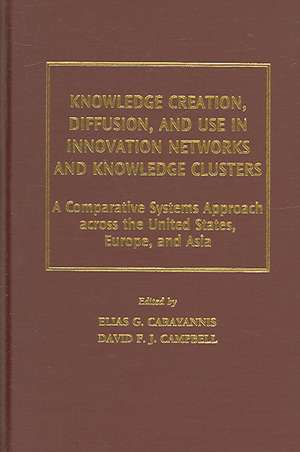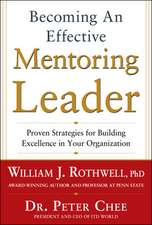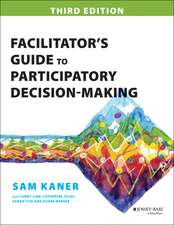Knowledge Creation, Diffusion, and Use in Innovation Networks and Knowledge Clusters: A Comparative Systems Approach Across the United States, Europe, and Asia
Editat de Elias G. Carayannis, David Campbellen Limba Engleză Hardback – 29 dec 2005 – vârsta până la 17 ani
Preț: 464.32 lei
Preț vechi: 610.51 lei
-24% Nou
Puncte Express: 696
Preț estimativ în valută:
88.85€ • 92.100$ • 73.95£
88.85€ • 92.100$ • 73.95£
Carte tipărită la comandă
Livrare economică 31 martie-14 aprilie
Preluare comenzi: 021 569.72.76
Specificații
ISBN-13: 9781567204865
ISBN-10: 1567204864
Pagini: 376
Dimensiuni: 156 x 235 x 32 mm
Greutate: 0.64 kg
Editura: Bloomsbury Publishing
Colecția Praeger
Locul publicării:New York, United States
ISBN-10: 1567204864
Pagini: 376
Dimensiuni: 156 x 235 x 32 mm
Greutate: 0.64 kg
Editura: Bloomsbury Publishing
Colecția Praeger
Locul publicării:New York, United States
Notă biografică
Elias G. Carayannis is Full Professor of Management Science in the School of Business and Public Management, director of Research on Science, Technology, Innovation and Entrepreneurship, European Union Research Center, and co-founder and co-director of the Global and Entrepreneurial Finance Research Institute (GEFRI) at the School of Business, George Washington University. He has published more than forty refereed journal articles and three books, The Strategic Management of Technological Learning, Idea Makers and Idea Brokers (Praeger, 2003), and The Story of Managing Products (Praeger, 2005).David F. J. Campbell is a Research Fellow at the Faculty for Interdisciplinary Studies (IFF), University of Klagenfurt, a Lecturer at the University of Vienna, and an Associate Professorial Lecturer at the Elliott School of International Affairs, George Washington University. Campbell co-edited Demokratiequalitat in Osterreich: Zustand und Entwicklungsperspektiven (2002) (Democratic Quality in Austria), and his articles on innovation and society have been published in several international journals.
Cuprins
INTRODUCTION & CHAPTER SUMMARIESMeaning and Implications from a Knowledge System Perspective by Elias G. Caryannis and David F. J. CampbellProductive Reasearch Teams and Knowledge Generation by Frank T, Anbari and Stuart A. UmpleyRe-Thinking Science: Mode 2 in Societal Context by Helga Nowotny, Peter Scott and Micheal GibbonsKnowledge Production: Competence Development and Innovation--Between Invention and Routine by Wolfgang H. GuttelKnowledge ProductionTrends in the United States, European Union and Japan by David F. CampbellInnovation in Clusters and the Liability of Foreignness of International R&D by Max von Zedtwitz and Philip HeimannTransatlantic Innovation Infrastructure Networks: Public-Private, EU-US R&D Partnerships by Elias G. Carayannis and Patrice LagetMeasuring Science-Technology Interaction in the Knowledge-Driven Economy by Martin S. MeyerThe Different Dynamics of the Biotechnology and ICT Sectors in Finland by Christopher Palmberg and Terttu LuukkonenThe Transformatiom of the German System of Innovation: The Case of Biotechnology by Edgar Grande and Robert KaiserCompetence Centers in Germany: How Can Policy Makers Support the Improved Diffusion of Knowledge? by Susanne BuhrerCooperations and Networking as Side Effect of the German Delphi '98 by Kerstin CuhlsCertification and Knowledge Management: An Approach Applied to the Space Transport Industry by Frederic Fontane, Patrice Houdayer and Franck VasseurInnovation Policy in the Knowledge-Based Economy: The Israeli Case Guy by Ben-AriUsing National Innovation Systems to Enhance S&T Policy: A Knowledge-Based Approach with Examples from Japan by Mark HewittVirtualization of Research Universities: Raising the Right Questions to Address Key Functions of the Institution by Thomas PfefferConclusion: Key Insights and Lessons Learned for Policy and PracticeINDEXAbout the Editors and Contributors














